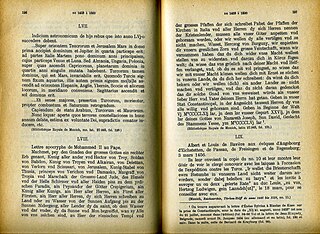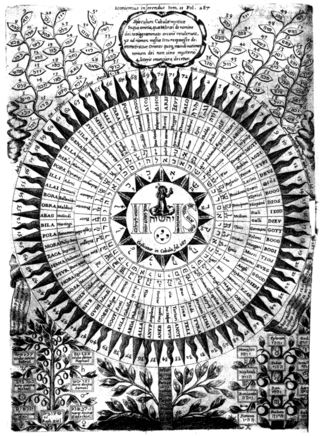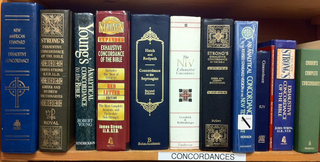Related Research Articles

Apocrypha are biblical or related writings not forming part of the accepted canon of scripture. While some might be of doubtful authorship or authenticity, in Christianity, the word apocryphal (ἀπόκρυφος) was first applied to writings that were to be read privately rather than in the public context of church services. Apocrypha were edifying Christian works that were not considered canonical scripture. It was not until well after the Protestant Reformation that the word apocrypha was used by some ecclesiastics to mean "false," "spurious," "bad," or "heretical."
The Old Testament (OT) is the first division of the Christian biblical canon, which is based primarily upon the 24 books of the Hebrew Bible, or Tanakh, a collection of ancient religious Hebrew and occasionally Aramaic writings by the Israelites. The second division of Christian Bibles is the New Testament, written in Koine Greek.
The word anathema has two main meanings. One is to describe that something or someone is being hated or avoided. The other refers to a formal excommunication by a church. These meanings come from the New Testament, where an Anathema was a person or thing cursed or condemned by God. In the Old Testament, an Anathema was something or someone dedicated to God as a sacrifice, or cursed and separated from God because of sin. These represent two types of settings, one for devotion, the other for destruction.
Jah or Yah is a short form of the tetragrammaton יהוה (YHWH), the personal name of God: Yahweh, which the ancient Israelites used. The conventional Christian English pronunciation of Jah is, even though the letter J here transliterates the palatal approximant. The spelling Yah is designed to make the pronunciation explicit in an English-language context, especially for Christians who may not use Hebrew regularly during prayer and study.

There are various names of God, many of which enumerate the various qualities of a Supreme Being. The English word god is used by multiple religions as a noun to refer to different deities, or specifically to the Supreme Being, as denoted in English by the capitalized and uncapitalized terms God and god. Ancient cognate equivalents for the biblical Hebrew Elohim, one of the most common names of God in the Bible, include proto-Semitic El, biblical Aramaic Elah, and Arabic ilah. The personal or proper name for God in many of these languages may either be distinguished from such attributes, or homonymic. For example, in Judaism the tetragrammaton is sometimes related to the ancient Hebrew ehyeh. It is connected to the passage in Exodus 3:14 in which God gives his name as אֶהְיֶה אֲשֶׁר אֶהְיֶה, where the verb, translated most basically as "I am that I am" or "I shall be what I shall be", "I shall be what I am" In the Hebrew Bible, YHWH, the personal name of God, is revealed directly to Moses. Correlation between various theories and interpretation of the name of "the one God", used to signify a monotheistic or ultimate Supreme Being from which all other divine attributes derive, has been a subject of ecumenical discourse between Eastern and Western scholars for over two centuries. In Christian theology the word is considered a personal and a proper name of God. On the other hand, the names of God in a different tradition are sometimes referred to by symbols. The question whether divine names used by different religions are equivalent has been raised and analyzed.
Moisés Silva is a Cuban-born American biblical scholar and translator.
Haran or Aran is a man in the Book of Genesis in the Hebrew Bible. He died in Ur of the Chaldees, was a son of Terah, and brother of Abraham. Through his son Lot, Haran was the ancestor of the Moabites and Ammonites.
The name Jerahmeel appears several times in the Tanakh. It means "He will obtain mercy of God", "God pities", "May God have compassion", "May God pity", or "Moon from God".
Almodad was a descendant of Noah and the first named son of Joktan in Genesis 10:26 and 1 Chronicles 1:20. While the Bible has no further history regarding Almodad, this patriarch is considered to be the founder of an Arabian tribe in "Arabia Felix". This is based on the identification of Joktan's other sons, such as Sheba and Havilah, who are both identified as coming from that region.

Jehovah is a Latinization of the Hebrew יְהֹוָהYəhōwā, one vocalization of the Tetragrammaton יהוה (YHWH), the proper name of the God of Israel in the Hebrew Bible/Old Testament. The Tetragrammaton יהוה is considered one of the seven names of God in Judaism and a form of God's name in Christianity.

Alcoholic beverages appear in the Hebrew Bible, after Noah planted a vineyard and became inebriated. In the New Testament, Jesus miraculously made copious amounts of wine at the wedding at Cana. Wine is the most common alcoholic beverage mentioned in biblical literature, where it is a source of symbolism, and was an important part of daily life in biblical times. Additionally, the inhabitants of ancient Israel drank beer and wines made from fruits other than grapes, and references to these appear in scripture. However, the alcohol content of ancient alcoholic beverages was significantly lower than modern alcoholic beverages. The low alcohol content was due to the limitations of fermentation and the nonexistence of distillation methods in the ancient world. Rabbinic teachers wrote acceptance criteria on consumability of ancient alcoholic beverages after significant dilution with water, and prohibited undiluted wine.
Messianic Bible translations are translations, or editions of translations, in English of the Christian Bible, some of which are widely used in the Messianic Judaism and Hebrew Roots communities.

A Bible concordance is a concordance, or verbal index, to the Bible. A simple form lists Biblical words alphabetically, with indications to enable the inquirer to find the passages of the Bible where the words occur.

Rebecca or Rebekah is a feminine given name of Hebrew origin. It is the name of the biblical figure Rebecca, wife of Isaac and mother of Jacob and Esau. The name comes from the Semitic root ר-ב-ק (r-b-q), meaning "to tie firmly"; Jones' Dictionary of Old Testament Proper Names and the NOBS Study Bible Name List suggest the name means captivating beauty, or "to tie", "to bind". W. F. Albright held that it meant "soil, earth".

The Bible usually uses the name of God in the singular, generally using the terms in a very general sense rather than referring to any special designation of God. However, general references to the name of God may branch to other special forms which express His multifaceted attributes. The Old Testament/Hebrew Bible reveals YHWH as the personal name of God, along with certain titles including El Elyon and El Shaddai. Jah or Yah is an abbreviation of Jahweh/Yahweh, and often sees usage by Christians in the interjection "Hallelujah", meaning "Praise Yah", which is used to give God glory. In the New Testament the terms Theos, Kyrios and Patēr are additionally used to reference God.
References
- ↑ Alfred Jones, Dictionary of Old Testament Proper Names 1856, republished Kregel Publications 1990